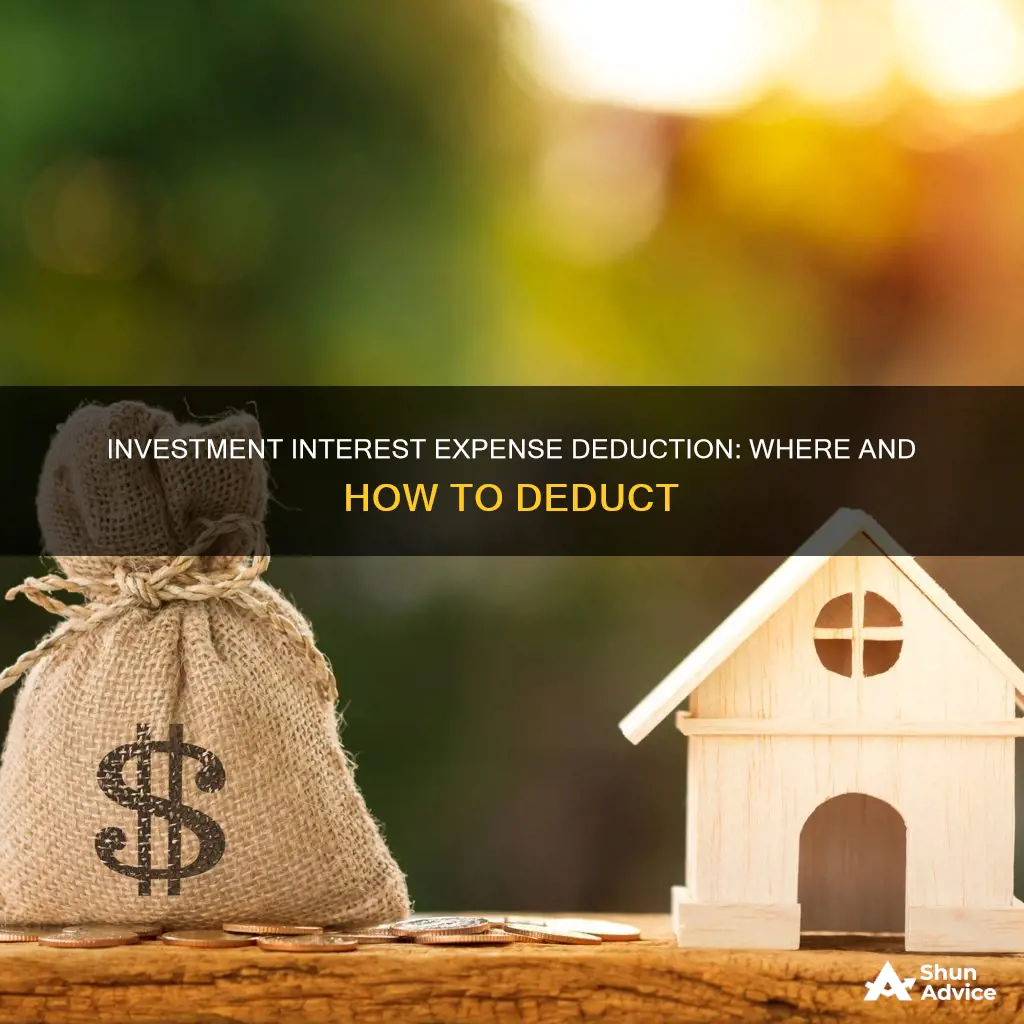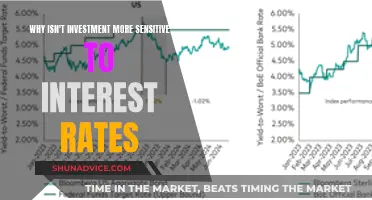
Investment interest expenses are any amount of interest that is paid on loan proceeds used to purchase investments or securities. This can include margin interest used to leverage securities in a brokerage account and interest on a loan used to buy property held for investment. Investment interest expenses are deductible in certain circumstances, such as when the proceeds from the loan were used to purchase property that produces a gain or a loss. However, there are a variety of limitations on the deductions that can be claimed, including restrictions on how much can be deducted and which investments qualify for the deduction.
| Characteristics | Values |
|---|---|
| What is it? | Any amount of interest that is paid on loan proceeds used to purchase investments or securities |
| When can it be deducted? | When it is interest paid on money borrowed to invest, but there are restrictions on how much can be deducted and which investments qualify |
| Limitations | Limited to the amount of investment income received, such as dividends and interest |
| What does it not include? | Interest incurred from a 'passive activity' investment, such as investing in a business that the taxpayer owns but does not actively manage |
What You'll Learn
- Investment interest expenses are deductible in certain circumstances
- Investment interest expenses are limited to the amount of investment income received
- Investment interest expenses are tax-deductible in some circumstances, but not when used for passive ventures
- Investment interest expenses can only be claimed by itemizing deductions on Schedule A and filing Form 4952
- Investment interest expenses are limited to the amount of taxable investment income earned in the same year

Investment interest expenses are deductible in certain circumstances
If an investment is made for both personal and business gain, income and expenses must be allocated proportionally. Investment interest expenses are tax-deductible in some circumstances, but not when used for passive ventures, such as investing in a business that the taxpayer owns but does not actively manage.
Investment interest expenses are deductible from AGI as an itemized deduction to the extent of net investment income. This is calculated as follows: Gross investment income - Investment expenses = Net investment income. Investment income is the gross income from property held for investment, excluding net capital gains from the disposition of property held for investment and qualified dividend income (QDI).
There are a variety of limitations on the deductions that can be claimed on investment interest expenses. The deduction may not be claimed if the proceeds from the loan went towards a property that generates nontaxable income, such as tax-exempt bonds. The deduction for investment interest expenses is limited to the amount of taxable investment income earned in the same year. Interest incurred from a 'passive activity' investment generally does not qualify for the investment interest deduction.
Investments: Do They Earn Interest?
You may want to see also

Investment interest expenses are limited to the amount of investment income received
There are a few things to keep in mind when it comes to investment interest expenses. Firstly, investment interest expenses are only deductible if they are related to an investment, such as margin loan interest or interest on an investment property. Secondly, if an investment is made for both personal and business gain, income and expenses must be allocated proportionally. Thirdly, investment interest expenses are tax-deductible in some circumstances, but not when used for passive ventures, such as investing in a business that the taxpayer owns but does not actively manage.
It's important to note that there are restrictions on how much you can deduct and which investments qualify you for the deduction. For example, interest incurred from a "passive activity" investment generally does not qualify for the investment interest deduction. Additionally, the deduction may not be claimed if the proceeds from the loan went towards a property that generates nontaxable income, such as tax-exempt bonds.
To claim the deduction for investment interest expenses, you must itemize deductions on Schedule A and file Form 4952. The federal tax code includes this deduction as an incentive to encourage investment. By allowing taxpayers to deduct interest paid on money borrowed for investments, the government hopes to stimulate economic growth and promote investment activity.
Understanding the Tax Code: Interest Expense and 163(j)
You may want to see also

Investment interest expenses are tax-deductible in some circumstances, but not when used for passive ventures
Investment interest expenses are deductible from AGI as an itemized deduction to the extent of net investment income. This is calculated as follows: Gross investment income - Investment expenses = Net investment income. Investment income is the gross income from property held for investment, excluding net capital gains from the disposition of property held for investment and qualified dividend income (QDI).
Investment interest expenses are limited to the amount of investment income received, such as dividends and interest. The deduction may not be claimed if the proceeds from the loan went towards a property that generates nontaxable income, such as tax-exempt bonds.
Interest incurred from a 'passive activity' investment generally does not qualify for the investment interest deduction. If an investment is made for both personal and business gain, income and expenses must be allocated proportionally.
Investment Interest: When Can You Deduct It?
You may want to see also

Investment interest expenses can only be claimed by itemizing deductions on Schedule A and filing Form 4952
If a taxpayer borrows money to buy investments (e.g. stocks and bonds), the interest on the loan is investment interest. Investment interest is deductible from AGI as an itemized deduction to the extent of net investment income. This is calculated by subtracting investment expenses from gross investment income.
It's important to note that there are limitations on the deductions that can be claimed on investment interest expenses. For example, the deduction may not be claimed if the proceeds from the loan went towards a property that generates nontaxable income, such as tax-exempt bonds. Additionally, interest incurred from a 'passive activity' investment generally does not qualify for the investment interest deduction.
Invest Wisely: Dave Ramsey's Guide to Smart Investing
You may want to see also

Investment interest expenses are limited to the amount of taxable investment income earned in the same year
The federal tax code includes incentives to encourage investment, one of which is the deduction for investment interest expenses. However, there are restrictions on how much you can deduct and which investments qualify you for the deduction. For example, interest incurred from a 'passive activity' investment generally does not qualify for the investment interest deduction. This includes investing in a business that the taxpayer owns but does not actively manage.
To claim the investment interest deduction, you must itemize deductions on Schedule A and file Form 4952. The deduction is limited to the amount of investment income received, such as dividends and interest, excluding net capital gains from the disposition of property held for investment and qualified dividend income (QDI).
It's important to note that the deduction may not be claimed if the proceeds from the loan went towards a property that generates nontaxable income, such as tax-exempt bonds.
Monthly Interest Investments: Where to Put Your Money
You may want to see also
Frequently asked questions
An investment interest expense is any amount of interest that is paid on loan proceeds used to purchase investments or securities.
The investment interest expense deduction is a federal tax code incentive to encourage investment. It allows you to deduct interest paid on money you borrow to invest.
You can claim the investment interest expense deduction by itemising deductions on Schedule A and filing Form 4952.
Yes, there are restrictions on how much you can deduct and which investments qualify you for the deduction. For example, interest incurred from a 'passive activity' investment generally does not qualify for the investment interest deduction.







